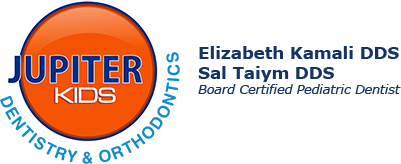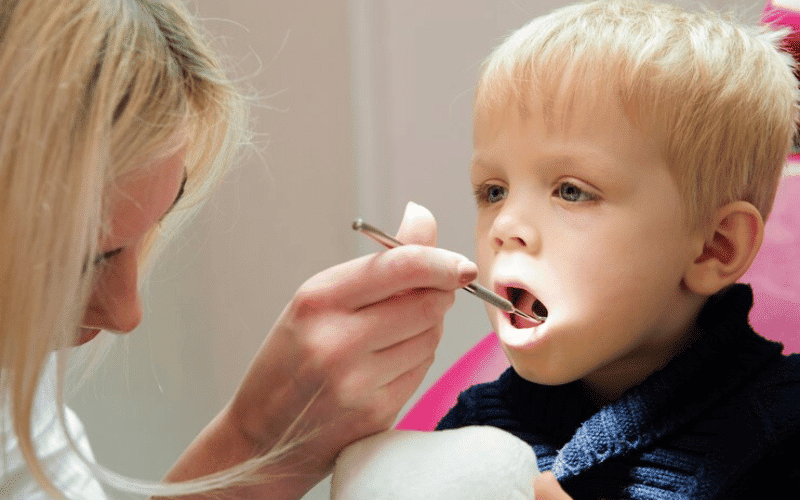As your precious little one grows and develops, witnessing their first milestones becomes an unforgettable journey. From their first wobbly steps to their first spoken words, each achievement fills your heart with immense joy and pride. But amidst the excitement, one important milestone often gets overlooked – your infant’s first oral exam. While it might not be at the top of your priority list, taking your baby for an infant oral exam is crucial for establishing a foundation for good oral health throughout their life.
This early visit allows dentists to assess your child’s oral development, identify any potential problems, and guide you on proper oral hygiene practices. This blog post aims to alleviate any anxieties you might have surrounding an infant’s first oral exam in Allen, TX. We’ll delve into what to expect during the appointment, answer frequently asked questions, and provide tips to prepare your little one for this essential first step toward a healthy smile.
The Importance of Infant Oral Exams
Many parents might need to be made aware that establishing dental care early on plays a crucial role in their child’s overall health and well-being. Infant oral exams, recommended by the American Academy of Pediatric Dentistry (AAPD), are vital for several reasons:
1. Early detection and prevention: Even before teeth erupt, an infant oral exam can identify potential issues like tongue ties, lip ties, or abnormal oral development. Early detection allows for timely intervention and treatment. Also, it prevents future complications and ensures proper development.
2. Establishing a dental home: Just like adults, children need a “dental home” – a familiar and trusted dental practice where they receive consistent care. Scheduling an infant oral exam by age one helps establish this dental home, fostering a positive association with dental visits from a young age. This can significantly reduce anxiety and make future checkups and procedures less stressful.
3. Oral health education for parents: During an infant oral exam, dentists and hygienists provide valuable guidance and education to parents. This includes proper oral hygiene practices for infants, such as cleaning their gums and emerging teeth, as well as information on diet, teething, and fluoride use.
What to Expect During Your Infant’s First Oral Exam?
An infant oral exam, recommended by the American Academy of Pediatric Dentistry (AAPD) by their first birthday or within 6 months of their first tooth erupting, lays the foundation for a lifetime of healthy teeth and gums. Knowing what to expect can help make this experience positive and informative for both you and your baby.
Setting the Stage for Success
- Pick a Pediatric Pro: Opt for a pediatric dentist specializing in treating young children. Their expertise and child-friendly environment will create a calming and playful atmosphere, easing any anxieties your little one might have.
- Schedule Smartly: Time the appointment strategically. Choose a time when your baby is typically well-rested and fed, ensuring they’re more comfortable and cooperative during the exam.
What to Expect During the Exam?
1. Building Rapport: The dentist or hygienist will become your baby’s dental buddy! They’ll introduce themselves warmly, using playful language, toys, or songs to build trust and create a comfortable environment.
2. Understanding Your Baby’s Health: The dentist will discuss your child’s medical history, including allergies, medications, and birth complications. This information helps them tailor the exam to your baby’s unique needs and ensure their safety and comfort.
3. A Gentle Examination: The dentist will carefully examine your baby’s mouth, teeth (if any have erupted), and gums. They’ll use specialized tools like a small mirror and light to check for any signs of decay, gum inflammation, or developmental concerns.
4. Cleaning and Early Education: If necessary, the dentist will gently clean your baby’s teeth using a soft brush and fluoride-free toothpaste. This not only removes plaque but also familiarizes your baby with the dental cleaning process. Additionally, you’ll receive valuable guidance on establishing a home care routine, including proper brushing techniques as your baby grows and develops.
Additional Points to Remember
- A Breezy Experience: The exam is often swift, focusing on a gentle visual inspection of your baby’s teeth and gums. Expect playful interaction to keep your little one comfortable.
- Open Communication is Key: You are highly encouraged to be present throughout the exam and actively participate. Don’t hesitate to ask questions about your baby’s oral health, teething process, or any concerns you might have.
- Building a Strong Foundation: The dentist might recommend fluoride supplements or topical fluoride applications based on your baby’s individual needs. Fluoride strengthens developing teeth, making them more resistant to cavities.
- Additional Insights:
- Talk to your child about the dentist beforehand using positive and age-appropriate language.
- Pack a favorite blanket or toy to help your baby feel at ease.
- Celebrate your baby’s bravery after the exam!
Frequently Asked Questions About Infant Oral Exams
Q: Are infant oral exams really necessary?
A: Absolutely! Early dental visits are crucial for establishing good oral health habits, preventing future problems, and ensuring your child’s healthy development.
Q: What if my baby doesn’t have any teeth yet?
A: Even before teeth erupt, an infant oral exam is essential. It allows the dentist to assess your child’s oral cavity for any abnormalities, monitor their jaw development, and offer guidance on oral hygiene practices for you to follow at home.
Q: My baby is fussy and doesn’t like being examined. What can I do?
A: Pediatric dentists are well-equipped to handle young children and create a calming environment. You can also help by preparing your child beforehand, talking about the visit in a positive light, and bringing along their favorite comfort item.
Taking your infant for their first oral exam might seem daunting, but it’s a crucial step towards ensuring their long-term oral and overall health. By understanding what to expect during the visit and being prepared, you can make this experience positive and pave the way for a lifetime of healthy smiles. Remember, infant oral exams in Allen, TX, are not just about teeth; they are an investment in your child’s well-being and a foundation for a healthy future.


